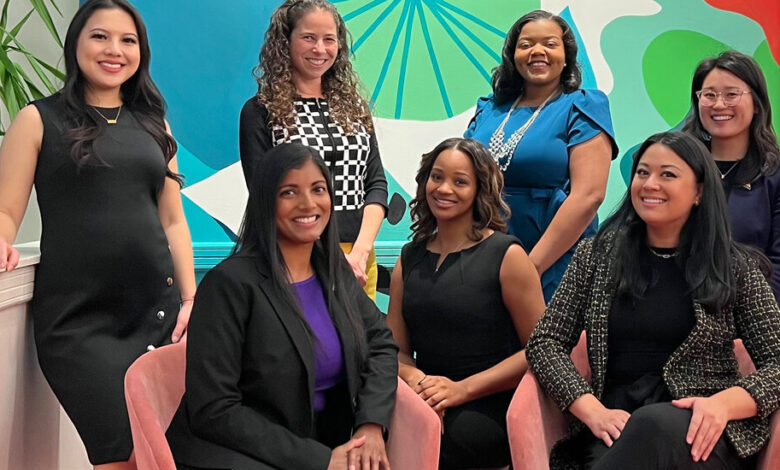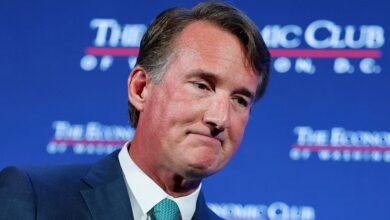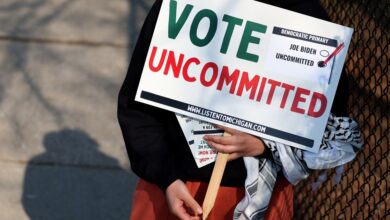All-Female City Council Marks a ‘Turning Point’ for St. Paul

There was a moment last summer when Nelsie Yang realized that she and six other women were on the verge of making history in St. Paul, Minn. The group of City Council candidates was knocking on doors to share their joint campaign message, one that could transform the makeup of the city’s governing body.
“It was such a powerful moment,” Ms. Yang, 28, said. “That collective work is how you win campaigns.”
In mid-November, Ms. Yang’s prediction came true when they were elected. And on Tuesday, the first all-women St. Paul City Council was sworn into office.
Ms. Yang, who has represented the Ward 6 as a councilwoman since 2020, called the moment surreal and, “frankly, long overdue.”
“This is the vision I had when I first started organizing eight years ago,” said Ms. Yang, who was the council’s first Hmong American. “Change doesn’t happen with the same voices at the table.”
St. Paul is believed to be among the largest cities in the country to have the distinction of having an all-female City Council. But the firsts do not stop there: All seven council members are under 40 years old, and six are women of color, making it the youngest and most racially diverse council in the city’s history, historians say.
The new council, all Democrats, includes three incumbents — Mitra Jalali, the council’s new president; Rebecca Noecker and Ms. Yang — and four newcomers: Anika Bowie, Cheniqua Johnson, Hwa Jeong Kim and Saura Jost. They include former teachers, nonprofit executives, community organizers and congressional aides. There is even a civil engineer, whose job experience will serve the Council well when road repair discussions come up, Ms. Jalali said.
“I’m really hoping for the chance to have much more refined policy conversations and bring our community into this work in a new way,” Ms. Jalali said.
When four of the City Council’s seven members decided they would step down at the end of 2023, Ms. Bowie, Ms. Johnson, Ms. Kim and Ms. Jost banded together to form a coalition, then added the three female incumbents to campaign together. Relying on a small group of women was familiar for Ms. Jost, the engineer who now represents Ward 3.
“It’s a small network of women, especially women of color. We all know each other,” she said. “That was so great to have that support system.”
Although the new makeup of the City Council may surprise some, several demographic shifts in St. Paul over the past few decades helped pave the way for this moment, Michael J. Lansing, a historian at Augsburg University in Minneapolis, said.
St. Paul’s history as an Irish-Catholic political stronghold began to change in the 1980s, when the city’s demographics started to shift, most notably with the arrival of Hmong and other immigrant communities. That period was also when City Council elections shifted from at-large elections to representation by ward.
But it would still take decades for the city’s leadership to catch up to St. Paul’s new demographics. In 2004, the city elected its first Black female council member, Debbie Montgomery. By 2018, the City Council was made up mostly of women. Two years later, George Floyd was murdered in neighboring Minneapolis, sparking a new wave of community organizing and political leadership.
Mr. Lansing called the election of seven women to City Council “a turning point for St. Paul.”
“They’re all under 40, they come from these different backgrounds, they’re probably going to be in politics for a while,” he said. “What do they do? What can they change? How do they see things differently?”
At 39, Ms. Noecker considers herself the “senior stateswoman” of the group, and that’s a good thing, she said: “That means we don’t have this backlog or baggage of institutional memory holding us down.”
Many council members have relied on the support of women who have come before them, including Amy Brendmoen, the council president who declined to run for re-election last year after serving 12 years at City Hall. She recommended that the council members tend their relationships among colleagues and think about the long game.
“That balance is how you accomplish your goals, and that’s where women thrive,” she said. “Remember to lock arms and do this together. We do that naturally. Taking that advice is how they got elected in the first place.”
Still, they know there will be differences to work through.
“It’s going to be important to learn how to disagree civilly,” Ms. Noecker said. “We’re not going to agree on everything. That’s the point.”
Ms. Bowie, who represents Ward 1, said she was “excited to see how we dance together.” She recognizes there will be fights, but she hopes they are “righteous fights.”
Housing, homelessness, economic development, a wide wealth gap and climate change are among the key issues facing the new council. But before the councilwomen got to work, there was the matter of being sworn in.
“While this is historic, it should also simply be the way it is,” Lt. Gov. Peggy Flanagan told a packed auditorium at their swearing-in ceremony at the Ordway Center for the Performing Arts in St. Paul on Tuesday. Young people, she told the council members, “are going to dream big and achieve their dreams because of the risk you were willing to take.”





